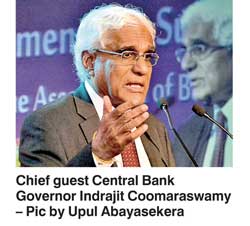Friday Feb 20, 2026
Friday Feb 20, 2026
Tuesday, 20 June 2017 00:10 - - {{hitsCtrl.values.hits}}
By Uditha Jayasinghe
Banks must build strong risk management into their corporate culture, Central Bank Governor Dr. Indrajit Coomaraswamy advocated yesterday, as a way to embed compliance into every level of decision-making within banks.
Speaking at ‘Risk Symposium 2017’ under the theme ‘Risk Management for Sustainable Value Creation’ organised by the Association of Banking Sector Professionals, the Governor was encouraging in his observations of the sector and insisted it was the “lifeblood” of the economy. 
“There is a need to meet regulatory expectations while simultaneously improving risk management and creating operational efficiencies to maximise profits in the organisations. Accomplishing these dual goals can be a challenging task for banks, boards and management. But if done effectively it has the potential to transform regulatory expectations into an opportunity to improve these capabilities and further integrate risk management practices in business unit processes and activities. The goal should be to address regulatory requirements in ways that reduce complexity, costs, risks and ultimately improve financial performance and shareholder value,” he said.
Shareholder value addition will attract investment, pointed out the Governor, who acknowledged that already banks are seen as an attractive sector with international banks showing interest in establishing links.
“Clearly financial mediation provided by the banking sector is the lifeblood of the economy. Efficient mediation is critical and managing risks to ensure we have stability is crucial for the future prospects of the economy and the country.”
“In light of the changing risk dimensions, banks are not only faced with conventional risk such as credit, market and operational and liquidity risk but new risks such as reputational risks, cyber risks and systemic risks. Therefore to address and combat these risks effectively banks must adopt a futuristic approach through appropriate business models, factor in macroeconomic variables and their impact, identify emerging risk concentration through stress testing and enhance risk reporting,” he added.
Formulating pre-emptive strategies based on the outcomes of stress testing and other risk reporting mechanisms are imported, Dr. Coomaraswamy insisted. The challenge banks face in identifying and managing unpredictable and unknown risks requires encouraging a holistic view of risks across the organisation. In order to overcome this challenge banks must build a strong risk management culture that is an integral part of the corporate values of the organisation, driven by the board of directors and senior management, he noted.
“Corporate values such as integrity, accountability and principle-based decision-making are the foundation for individual behaviour across organisations and a strong shared risk culture embeds risk compliance into everyday activities.”
In the aftermath of the 2008 global financial crisis there have been many regulatory measures to strengthen and foster prudent behaviour by banks. Regulations such as Basel III demand greater capital, leverage, liquidity and funding requirements as well as higher standards of risk reporting by banks, the Governor went on to say.
The Central Bank of Sri Lanka has also mirrored these international best practices and updated legal regulations and other stipulations to strengthen local financial systems.
“The Central Bank has also issued guidelines on credit risk and market risk and has encouraged banks to upgrade management frameworks in keeping with the regulations issued by it to carry out banking business sustainably by managing their risk exposures effectively and prudently. This will assist them to achieve their strategic targets effectively.”